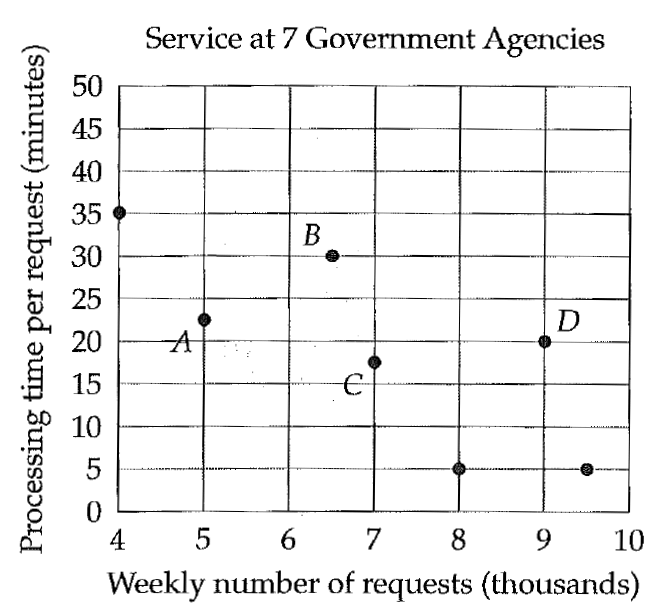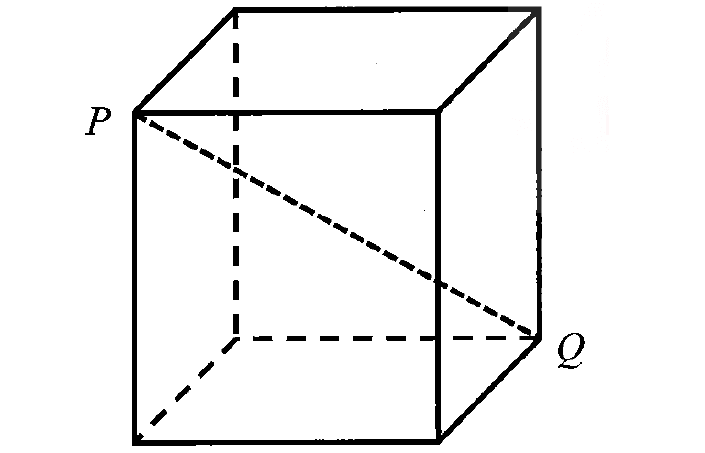8th GRADE MATH WORKSHEET WITH ANSWERS
Question 1 :
The quadratic equation n2 - 6n - 55 is prime, then the largest value of n is
(A) 12 (B) 15 (C) 28
Solution :
Bye factoring the quadratic equation n2 - 6n - 55, we get
= (n - 11)(n + 5)
|
If n = 12 = (12-11) (12+5) = 17 Prime If n = 28 = (28-11) (28+5) = 17(33) = 561 Not Prime |
If n = 15 = (15-11) (15+5) = 4(20) = 80 Not prime |
So the largest value of n is 12.
Question 2 :
A rectangle has been divided into congruent squares such that the sum of the perimeters of the squares is numerically equal to the area of the rectangle. What is the length of a side of one of the squares ?
(A) 2 (B) 4 (C) 10
Solution :
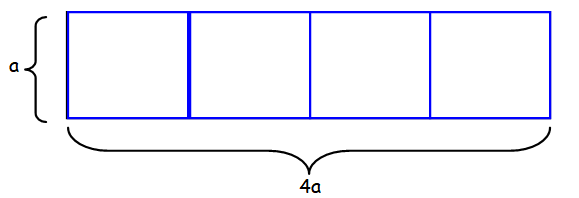
4 ⋅ Perimeter of square = Area of rectangle
4(4a) = 4a(a)
16a = 4a2
4a = 16
a = 16/4
a = 4
Question 3 :
Paul and Mary are assigned a mathematics project to work on. If Paul works on it alone for 6 hours and let Mary take over, Mary needs another 12 hours to complete.
If Paul works on it for 8 hours then hands it over to Mary, she will need another 6 hours. How many hours does Mary alone to complete the project if Paul has already worked on it for 3 hours ?
(A) 21 hours (B) 48 hours (C) 30 hours
Solution :
Let x and y be the number of hours taken by Paul and Mary respectively.
Working rate of Paul = 1/x
Working rate of Mary = 1/y
Let 1/x and 1/y as a and b respectively.
Work done by Paul in 6 hours = 6/x ==> 6a
Work done by Mary in 12 hours = 12/y ==> 12b
6a + 12b = 1 ------(1)
8a + 6b = 1 ------(2)
(1) - (2) ⋅ 2
6a + 12b = 1
16a + 12b = 2
(-) (-) (-)
--------------------
-10a = -1
a = 1/10 ==> x = 10
So, Paul is taking 10 days to complete the job.
By applying the value of a in (1), we get
6(1/10) + 12b = 1
12b = 1 - (3/5)
12b = 2/5
b = 1/30 ==> y = 30
Mary is taking 30 days to complete the work.
Working rate of Paul in 1 hour = 1/10
Work done by Paul in 3 hours = 3/10
Part of the work to be completed = 1 - (3/10)
= 7/10
Time taken by Mary to complete the work
= (7/10) / (1/30)
= 21 hours
Question 4 :
In how many ways can a person go from the origin to the point (3, 3) if he can only move upwards and rightwards and his one step is one unit ?
(A) 10 (B) 20 (C) 30
Solution :
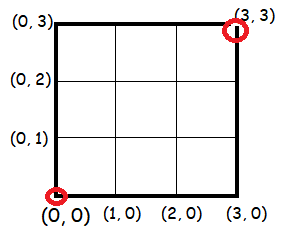
We can reach the point (3, 3) by choosing upwards and right wards directions only.
Choosing any one of the ways, we have to cover 3 horizontal steps and 3 vertical steps.
So, total number of steps is 6.
Number of different ways = 6!/3!3!
= 20 ways
Question 5 :
A company could choose any of the three builders (Anthony, Bob and Charles) to build a wall. Anthony would take A days to build the wall. Likewise, Bob and Charles would take B days and C days to build the wall respectively, The table shows the number of days needed to build the same wall if two of them worked together at the same time.
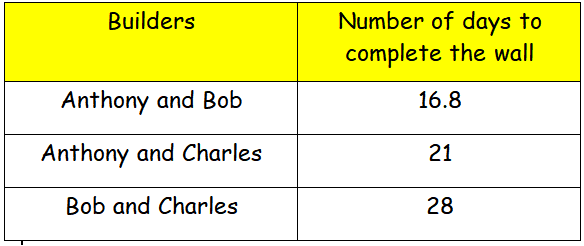
Find the value of A + B + C.
(A) 168 (B) 134 (C) 152
Solution :
Work done by Anthony in 1 day = 1/A
Work done by Bob in 1 day = 1/B
Work done by Charles in 1 day = 1/C
1/A + 1/B = 1/16.8
1/A + 1/B = 5/84 ------(1)
1/A + 1/C = 1/21 ------(2)
1/B + 1/C = 1/28 ------(3)
(1) - (2)
1/B - 1/C = 5/84 - 1/21
1/B - 1/C = 1/84 ----(4)
(3) + (4)
2/B = 1/28 + 1/84
2/B = 4/84
2/B = 1/21
1/B = 1/42
Applying the value of 1/B in (4), we get
1/42 - 1/C = 1/84
1/C = 1/42 - 1/84
1/C = 1/84
Applying the value of 1/C in (2), we get
1/A + 1/84 = 1/21
1/A = 1/21 - 1/84
1/A = 3/84
1/A = 1/26
The values of A, B and C are 26, 42 and 84 respectively.
A + B + C = 26 + 42 + 84
A + B + C = 152
So, the value of A + B + C is 152.
Question 6 :
ABC is a right angled triangle with <CAB = 90. ADEF is a rectangle such that D lies on AB, E lies on BC and F lies on AC. IF BD = 4 cm and CF = 5 cm, find the area in cm2 of the rectangle ADEF.
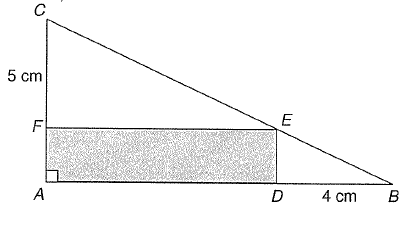
(A) 16 cm2 (B) 20 cm2 (C) 12 cm2
Solution :
It is not possible to find the length and width of the rectangle. So let us make a reflection
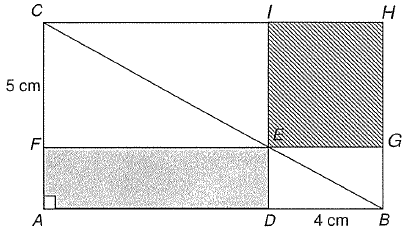
DB = EG = 4 cm and FC = IE = 5 cm
Area of rectangle AFED = Area of EGIH
Area of rectangle EGIH = length ⋅ Width
= 4 ⋅ 5
= 20 cm2
So, area of rectangle AFED is 20 cm2.
Question 7 :
Find the total number of prime factors in the product
{(4)11 ⋅ 75 ⋅ (11)2 }
(A) 25 (B) 4 (C) 29
Solution :
= {(4)11 ⋅ 75 ⋅ (11)2 }
= {(22)11 ⋅ 75 ⋅ (11)2 }
= 222 ⋅ 75 ⋅ 112
Total number of factors = 22 + 5 + 2
= 29
So, the total number of factors are 29.
Question 8 :
Rhodes, Watson, Rambo, Peter, Mark and Dwayne are standing in a line with their backs to a wall. How many different orders could they be standing in so that Rhodes and Dwayne are standing next to each other?
(A) 140 (B) 240 (C) 160
Solution :
Considering Rhodes and Dwayne has one unit, the other 4 has separate units.
4 + 1 = 5
= 5! 2!
= 120 (2)
= 240
So, the answer is 240.
Question 9 :
If x = 5 then find the value of x2 - 5
(A) 20 (B) 30 (C) 5
Solution :
By applying x = 5
= 52 - 5
= 25 - 5
= 20
So, the answer is 20.
Question 10 :
A group of seven students working on a project needs to choose two students to present the group's report. How many ways can they choose the two students ?
(A) 30 (B) 21 (C) 38
Solution :
To choose two students out of 7 students, the total number of ways = 7 C 2
= 7!/(7 - 2)! 2!
= 7!/5!2!
= (7 ⋅ 6 ⋅ 5!) / 5! 2!
= 21 ways

Answer Key
|
1) 12 2) 4 3) 21 hours 4) 20 ways 5) 152 |
6) 20 cm2 7) 29 8) 240 9) 20 10) 21 |
Kindly mail your feedback to v4formath@gmail.com
We always appreciate your feedback.
©All rights reserved. onlinemath4all.com
Recent Articles
-
Digital SAT Math Problems and Solutions (Part - 153)
Apr 29, 25 12:18 PM
Digital SAT Math Problems and Solutions (Part - 153) -
Digital SAT Math Problems and Solutions (Part - 152)
Apr 28, 25 11:54 AM
Digital SAT Math Problems and Solutions (Part - 152) -
Digital SAT Math Problems and Solutions (Part - 151)
Apr 26, 25 11:18 AM
Digital SAT Math Problems and Solutions (Part - 151)
